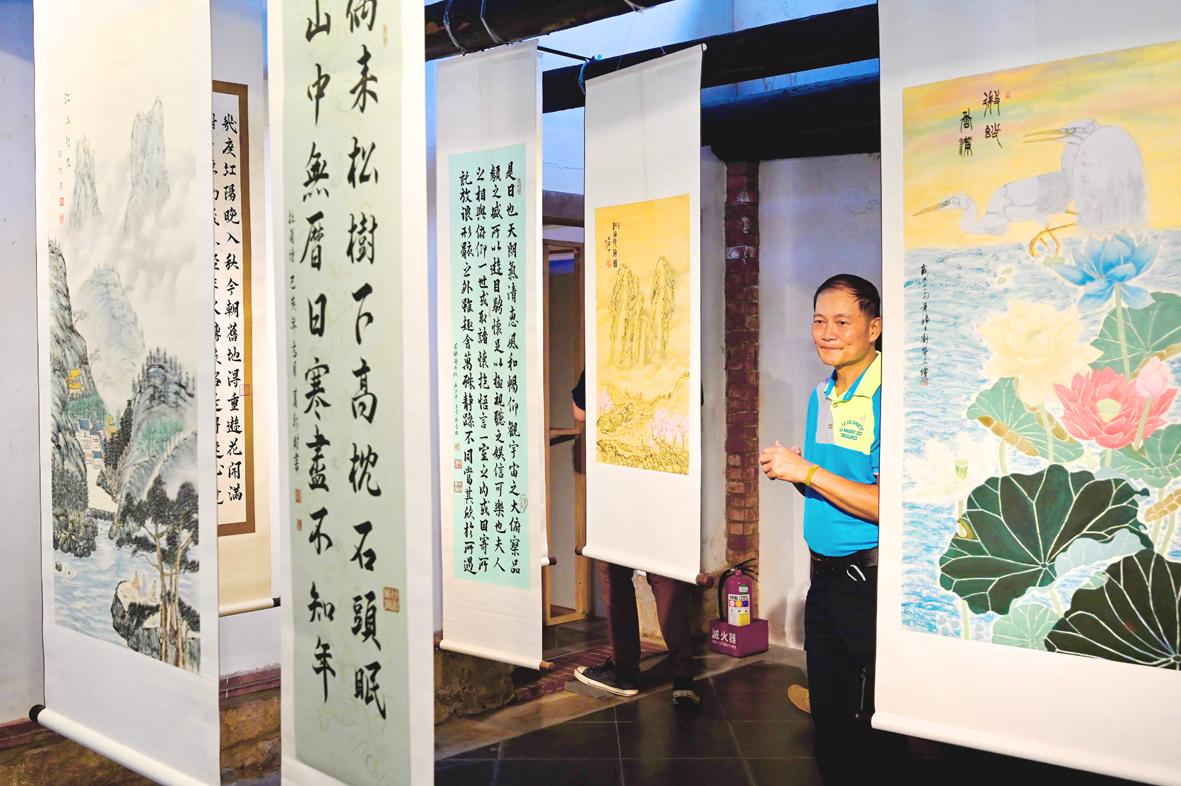A touring exhibition of works of art by people who have been on death row began yesterday at the Bopiliao Historic Block in Taipei’s Wanhua District (萬華), with organizers inviting people to ponder inmates’ potential to change and alternatives to the death penalty.
The Not Who We Were exhibition displays more than 20 calligraphy works or paintings by 15 people, including Cheng Hsing-tse (鄭性澤), who spent 14 years behind bars until he was acquitted in 2017.
Not every prison offers art classes, but he had the opportunity to learn Chinese painting from 2014 at a prison in Taichung, Cheng told a news conference.

Photo: Sam Yeh / AFP
Some inmates sent their work to family members, but in that way, members of society would not see how they had changed, he said.
“The death penalty is not the only way to solve problems. I hope people can see the possibilities for inmates who are sentenced to death,” he said.
The exhibition features a simulated prison ward of 1.368 ping (4.5m2) with one toilet and two beds.
Some people say that inmates live a comfortable life, but the simulated cell shows that the walled space with only one window is very narrow, Taiwan Alliance to End the Death Penalty executive director Lin Hsin-yi (林欣怡) said.
Death row inmates are usually known for their worst acts, but few know how they can transform after being in prison, Lin said.
The exhibition aims to encourage people to see the possibility of change in inmates and how that might be prompted through social assistance, she said.
Trade Office of Swiss Industries deputy director Beatrice Latteier, who also attended the opening, said she is impressed by the artwork and wished she could read the calligraphic characters so she could understand the creators’ mindsets.
“For Switzerland, the promotion of human rights is an important concern and a foreign policy goal. The death penalty is against human rights and is neither a deterrent nor does it contribute to reconciliation,” Latteier said.
Hopefully, Taiwanese society would be open to discuss the abolition of capital punishment, with both sides willing to communicate, she said.
The exhibition in Taipei runs through July 26 and would travel to Miaoli County from Aug. 1 to 9 and to Tainan from Aug. 22 to Sept. 3.

Taiwan has received more than US$70 million in royalties as of the end of last year from developing the F-16V jet as countries worldwide purchase or upgrade to this popular model, government and military officials said on Saturday. Taiwan funded the development of the F-16V jet and ended up the sole investor as other countries withdrew from the program. Now the F-16V is increasingly popular and countries must pay Taiwan a percentage in royalties when they purchase new F-16V aircraft or upgrade older F-16 models. The next five years are expected to be the peak for these royalties, with Taiwan potentially earning

STAY IN YOUR LANE: As the US and Israel attack Iran, the ministry has warned China not to overstep by including Taiwanese citizens in its evacuation orders The Ministry of Foreign Affairs (MOFA) yesterday rebuked a statement by China’s embassy in Israel that it would evacuate Taiwanese holders of Chinese travel documents from Israel amid the latter’s escalating conflict with Iran. Tensions have risen across the Middle East in the wake of US and Israeli airstrikes on Iran beginning Saturday. China subsequently issued an evacuation notice for its citizens. In a news release, the Chinese embassy in Israel said holders of “Taiwan compatriot permits (台胞證)” issued to Taiwanese nationals by Chinese authorities for travel to China — could register for evacuation to Egypt. In Taipei, the ministry yesterday said Taiwan

Taiwan is awaiting official notification from the US regarding the status of the Agreement on Reciprocal Trade (ART) after the US Supreme Court ruled US President Donald Trump's global tariffs unconstitutional. Speaking to reporters before a legislative hearing today, Premier Cho Jung-tai (卓榮泰) said that Taiwan's negotiation team remains focused on ensuring that the bilateral trade deal remains intact despite the legal challenge to Trump's tariff policy. "The US has pledged to notify its trade partners once the subsequent administrative and legal processes are finalized, and that certainly includes Taiwan," Cho said when asked about opposition parties’ doubts that the ART was

If China chose to invade Taiwan tomorrow, it would only have to sever three undersea fiber-optic cable clusters to cause a data blackout, Jason Hsu (許毓仁), a senior fellow at the Hudson Institute and former Chinese Nationalist Party (KMT) legislator, told a US security panel yesterday. In a Taiwan contingency, cable disruption would be one of the earliest preinvasion actions and the signal that escalation had begun, he said, adding that Taiwan’s current cable repair capabilities are insufficient. The US-China Economic and Security Review Commission (USCC) yesterday held a hearing on US-China Competition Under the Sea, with Hsu speaking on